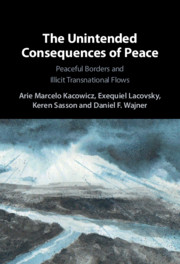Book contents
- The Unintended Consequences of Peace
- The Unintended Consequences of Peace
- Copyright page
- Dedication
- Contents
- Tables
- Preface
- Abbreviations
- 1 The Reality of Peaceful Borders and Illicit Transnational Flows
- 2 A Framework to Explain the Reality of Peaceful Borders and Illicit Transnational Flows
- 3 The Americas: A General View
- 4 The Americas: From the US-Canadian Border to the Tri-Border Area of South America
- 5 Europe: The Schengen Regime and the Western Balkan Borders
- 6 A Triangle of Peace in the Middle East: The Israeli–Egyptian and Israeli–Jordanian Borders
- 7 The Southern African Borders in the Postapartheid Era
- 8 ASEAN and the Southeast Asian Borders
- 9 Comparisons, Policy Recommendations, and Conclusions
- References
- Index
8 - ASEAN and the Southeast Asian Borders
Published online by Cambridge University Press: 11 June 2021
- The Unintended Consequences of Peace
- The Unintended Consequences of Peace
- Copyright page
- Dedication
- Contents
- Tables
- Preface
- Abbreviations
- 1 The Reality of Peaceful Borders and Illicit Transnational Flows
- 2 A Framework to Explain the Reality of Peaceful Borders and Illicit Transnational Flows
- 3 The Americas: A General View
- 4 The Americas: From the US-Canadian Border to the Tri-Border Area of South America
- 5 Europe: The Schengen Regime and the Western Balkan Borders
- 6 A Triangle of Peace in the Middle East: The Israeli–Egyptian and Israeli–Jordanian Borders
- 7 The Southern African Borders in the Postapartheid Era
- 8 ASEAN and the Southeast Asian Borders
- 9 Comparisons, Policy Recommendations, and Conclusions
- References
- Index
Summary
In this chapter, we examine the links between peaceful borders among the Southeast Asian countries and the occurrence and proliferation of illicit transnational flows, especially with regard to drug trafficking, human trafficking and smuggling, and arms trafficking. Southeast Asia is the most stable and peaceful among the Asian regions. Regional peace in the Southeast Asian region, especially after 1991, has contributed to its phenomenal economic growth and development, which, in turn, has led to higher levels of integration. At the same time, expanding economic and infrastructure links around region have also facilitated the occurrence of illicit transnational flows, including transnational organized crime and terrorism. The issue of transnational crime addresses the question of national sovereignty. On the one hand, illicit transnational flows pose a threat to the national sovereignty and the territorial integrity of independent states.On the other hand, effective cooperation in combating transnational crime and terrorism requires a political decision by national governments to surrender some parts and pieces of their sovereignty. In this sense, the Southeast Asian countries have traditionally been strong defenders of the sanctity of national sovereignty and nonintervention.
Keywords
- Type
- Chapter
- Information
- The Unintended Consequences of PeacePeaceful Borders and Illicit Transnational Flows, pp. 204 - 226Publisher: Cambridge University PressPrint publication year: 2021



